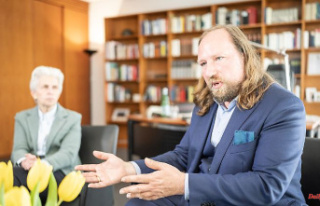Formally, the Russian President imposed martial law only on the occupied territories in Ukraine. However, experts fear consequences for all regions of Russia. Travel restrictions for young men who want to avoid serving at the front could take effect immediately. The Kremlin immediately dismissed it.
Looking at the exact text of Vladimir Putin's martial law in the occupied territories, Russian experts have pointed out that it could theoretically affect virtually all regions of Russia in one way or another. Kremlin spokesman Dmitry Peskov immediately countered fears that Russia would now close its borders to its own citizens. That was not planned, he told the state news agency Ria Nowosti. Moscow's Mayor Sergei Sobyanin also emphasized that martial law in the four annexed areas will "currently" not affect the everyday life of the capital's residents.
Russian President Putin has still not called his attack on Ukraine, which he described as a "special military operation," a war. However, he declared a state of war in the four annexed regions - partly on the grounds that Ukrainian martial law had already applied there before the annexation. As a result, Russian martial law applies in the occupied territories with immediate effect, which is accompanied by massive restrictions on civil rights. For example, there is a curfew and military censorship; checkpoints are set up and movement options are restricted.
Russian human rights lawyer Pavel Chikov explained that arrests of up to 30 days, the confiscation of property, the detention of foreigners and, in principle, travel restrictions for Russian citizens abroad are also possible. Forced labor in armaments factories should also be possible. Chikov and other experts pointed out that in connection with martial law, basically all regions of Russia could be affected in one way or another.
According to the Kremlin, the state of war means that the guarding of military and other state objects will be further tightened. It is therefore particularly important to ensure public order, i.e. to increase the protection of traffic and communication routes and energy systems, for example. In addition, evacuations can be ordered to move people to safe regions.
Citizens could also be used to help with defense tasks, for example to eliminate war damage, continues the lawyer Chikov. Last but not least, the work of political parties and the right to assembly or to strike are restricted. Human rights activists fear that the difficult situation in the affected Ukrainian regions, which were already living under martial law, will continue to worsen because the authorities have greater powers.
The Ukrainian government reacted calmly to Putin's latest moves. Presidential adviser Mykhailo Podoliak said: "The martial law imposed by Russia in the occupied territories is nothing more than a pseudo-legitimation for the looting of Ukrainian property." This changes nothing for Ukraine. "We will continue with the liberation and end of the occupation," said Podoliak.












